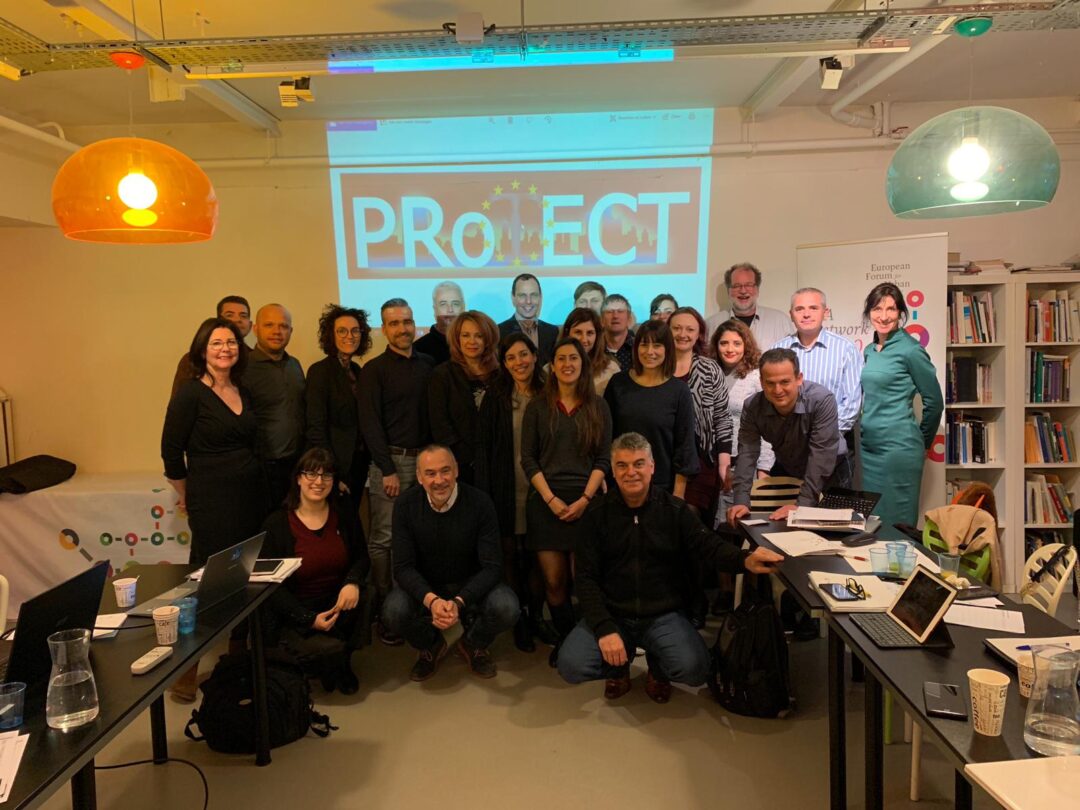Paris, France, February 2021 – Officially launched in December, the new Efus-led Secu4All project started in earnest on 26 January with the (online) kick-off meeting during which the partners discussed the scope of the project, which seeks to strengthen the capabilities of local and regional authorities in ensuring the security of public spaces and the protection of soft targets (i.e. sport venues, shopping malls, schools, transport system…) against potential risks.
A wide range of threats and risks affecting urban public spaces
The consortium’s* representatives discussed a wide range of threats and risks that affect urban public spaces, such as terrorism, petty crime and incivilities, riots and new phenomena such as the Covid-19 pandemic. These pose constantly-evolving challenges to local and regional authorities who must find the right balance between ensuring public spaces are safe and preserving their inherent openness and universal accessibility. In order to do so, they need to strengthen their knowledge and capabilities.
Designed by Efus, Secu4All aims to do just that by providing training in four areas:
- methods and tools to assess the vulnerability of local public spaces;
- improving communication with relevant stakeholders in case of crisis (before, during and after);
- innovative technologies to reinforce the protection of public spaces and exchange of expertise on the ethical use of such technologies and the collected data;
- reduce citizens’ feelings of insecurity by means of urban planning design and management of public spaces.
A comprehensive training programme
The project essentially consists in a comprehensive training programme aimed at local and regional authorities and local security actors. Structured in four modules, it comprises virtual and interactive learning sessions, practical exercises and case studies. Field visits to different European cities with significant expertise in the protection of public spaces and soft targets will complement the sessions.
The training programme is not reserved for the Secu4All partners. Indeed, an e-learning platform will be set up at the end of the project featuring the training content in English, French, German and Italian so as to be available to all Efus members and beyond.
During the kick-off meeting, participants were able to give their feedback on the training content and on the main risks and challenges they face in managing their local public spaces, as well as existing protective measures. For example, The Hague has a three-phase model to evaluate the level of risk in a public space and determine the appropriate response accordingly. Another example is Xábia, which focuses on the use of technology to control access to highly frequented areas such as the nightlife districts, the training of local police to respond to critical situations such as a terrorist attack, and efforts to improve the planning and design of the town’s recreation areas in order to make them safer and more accessible.
The need to work based on broad local partnerships
As important as it is, the acquisition of knowledge and capabilities is not sufficient to properly protect urban public spaces while preserving their openness. Efus and the project consortium also discussed a key aspect, which is that this requires well-oiled and broad local partnerships.
Indeed, it is the responsibility of local and regional authorities to promote and coordinate a multi-stakeholder approach involving all relevant actors (police, residents and users, emergency services, local businesses, etc.). How to do this efficiently and with whom is also a core aspect of the Secu4All project.
* The partners are: DITSS (Netherlands) Dsp-groep Bv-DSP (Netherlands), KEMEA (Greece), the CRIMINA centre of the Miguel Hernandez University in Elche (Spain), the European Organisation for Security-EOS (Belgium) / Bruxelles – Prévention & Sécurité (Belgium), DEFUS (Germany), FFSU (France), FISU (Italy), The Hague (Netherlands), Riga Municipal Police (Latvia), Xábia (Spain).
> You can follow regular updates on the topic of Public Spaces on Efus Network



